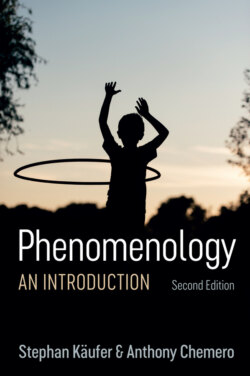Читать книгу Phenomenology - Anthony Chemero - Страница 8
Phenomenology now
ОглавлениеA broad range of researchers in philosophy and psychology departments are empirically and conceptually investigating affordances, or the role of our bodies in perception and cognition, or action as a condition for maintaining a sense of the self. We claim that such work is not merely influenced by phenomenology, something that most of these people would readily accede to whether they have read Heidegger or not. We think that they are doing phenomenology, insofar as they are pursuing the basic ideas and insights this tradition was founded on. Still, some readers may be surprised that ecological psychology and embodied cognitive science belong among the proper successors of Heidegger and Merleau-Ponty. This is understandable, because the chain of influence that leads from Heidegger to, say, Gibson, dynamical systems theory, or enactivism is not clear or well known. It is easier and more common to point out more obvious threads, such as that Merleau-Ponty and Sartre were friends and collaborators for a while, and that Sartre was a giant in post-war French philosophy, from which Levinas, Derrida, and Deleuze emerged as important figures.
We hope that the narrative of this book vindicates our claim in detail, but here are two quick reminders that should make it plausible from the start. Merleau-Ponty’s work is obviously indebted to Husserl, and even more deeply to Heidegger. The third big source of his thought is his sustained critical examination of Gestalt psychology. This also had a major impact on Gibson, who was Kurt Koffka’s colleague at Smith College for several years in the 1930s, just as Gibson was beginning to develop the first ideas of ecological psychology. Beyond this parallel influence of Gestalt psychology on Merleau-Ponty and Gibson, there was possibly a direct influence of the former on the latter. Though Gibson himself would deny it, some of his students recall that later he would often compare his work to Merleau-Ponty’s Phenomenology of Perception, to the point of trying to ward off prospective graduate students by telling them they should read this impenetrable book first, and only come back when they had understood it.
More crucial than a common ancestry in Gestalt psychology is the work of Hubert Dreyfus, who brought the views of Heidegger and Merleau-Ponty into current philosophy and cognitive science. In the 1960s and 1970s Dreyfus used his unusually insightful understanding of Heidegger’s work to formulate sharp criticisms of the then burgeoning research projects in artificial intelligence. The following three decades of artificial intelligence research tell the history of the many ways in which Dreyfus’ original critique transformed the field’s understanding of human intelligence. It has led to many attempts to explain intelligent behavior in terms of the coupling of agent, body, and environment.
